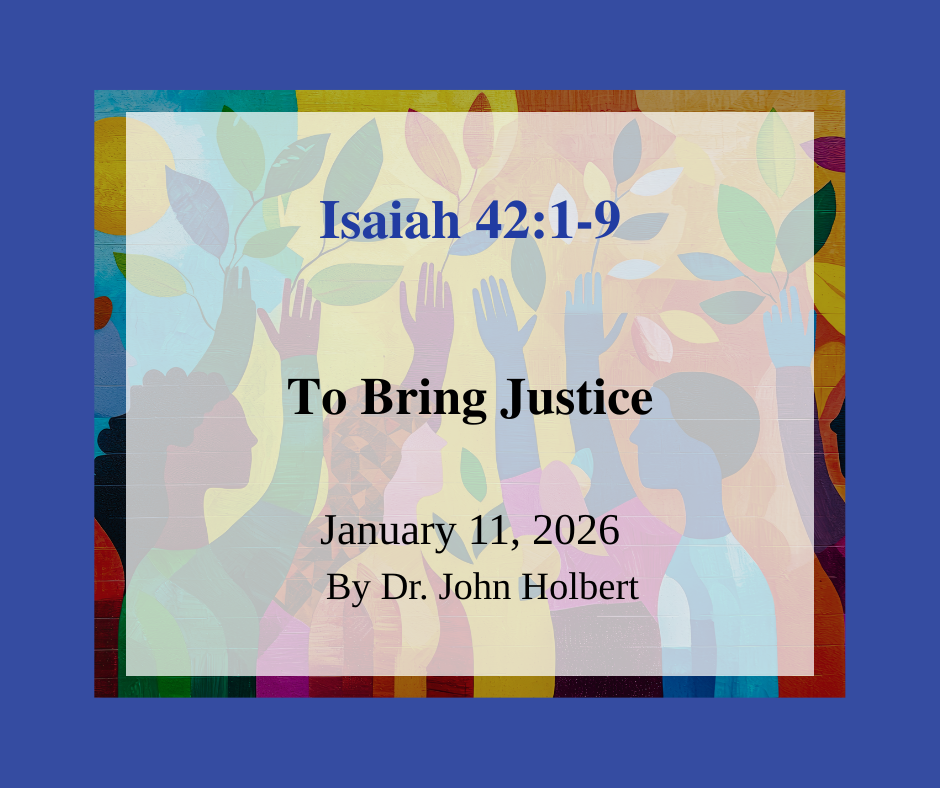To Bring Justice - Reflections on Isaiah 42:1-9, Baptism of the Lord, Year A
by John C. Holbert on Tuesday, November 4, 2025

Today’s passage is the first of the four so-called “Servant Songs,” presented by 2-Isaiah interspersed within his 16-chapter book. These songs have generated intense debate among scholars for centuries, concerning just who the servant may be as well as what the servant is called to do, and how he is called to do it. This brief essay can hardly take all that lengthy discussion on, but I propose to focus attention on a guess at just who the servant in this passage may be, as well as the central goal of that servant’s work, as designated by YHWH.
2-Isaiah was certainly composed toward the end of the exile of Judah, sometime around 539-537 BCE, because the poet specifically mentions the king of Persia, Cyrus, who in and around 539 took over the empire of Babylon, in an apparently near-bloodless way, and immediately began to inquire of the former captives in Babylon what they wished to do about their possible continued residence in the city, or their desire to return to their former homes. Those Judean exiles who wanted to return to Jerusalem were given leave to do so, and even supported by the great Persian monarch with money and transport given for their return. Little wonder that Isaiah named Cyrus “Messiah of God,” (Is.45:1), a rather shocking designation, since Cyrus knew precisely nothing of the Judean captives, knew not a word of Hebrew, and had never thought a moment about Judah or Jerusalem! Isaiah recognizes these facts when he announces: “I am YHWH, and no other; there is no God beside me; I arm you, though you do not know me” (Is.45:5). (This passage, among some others, has led certain political figures in our time to proclaim that leaders need not know anything of God and yet still be agents of that God, despite their obvious ignorance of, even false use of God. The current US president and his supporters come to mind.)
I suggest that the servant here is not exactly Judah as a whole, but rather a portion of the Judean captives. Historically, a large group of those exiles remained in Babylon, forming the kernel of what became a very significant Jewish enclave that produced in time the Babylonian Talmud, an important document of collected stories and sayings that served the diasporic community of Jews throughout the world. It may well be that Isaiah had something like that emerging Jewish community in mind as he formulated his idea of the servant of YHWH. Regardless, however, of precisely who the servant may have been, the role of the servant is plain enough: the servant is to “bring justice to the nations.”
This is of course an enormous undertaking. The size of the work of bringing justice to the nations is made clear when we attempt to define exactly what “justice” may in fact be. The Hebrew word is a noun form, created from the verb shaphat, a word with very wide connotations. It can mean “to rule,” “to govern,” “to command,” “to judge,” “to arbitrate,” “to warn,” “to punish,” “to vindicate.” As a consequence of all these possible meanings, the noun mishpat likewise possesses many possible implications: along with “justice,” it may mean “judgment,” “rights,” “vindication,” “deliverance,” “custom,” or even “norm.” Despite all these myriad meaning possibilities, the evidence of the word’s use attests that originally and basically it refers to the restoration of a situation or environment that promoted equity and harmony in a community. The word shalom springs to mind, that marvelous locution that announces unity and wholeness in a once-divided place. Mishpat, it could be said, leads to shalom, that state of joyous and harmonious community. This is to be the role of the servant of YHWH, to engender justice to the nations, leading to the harmony of the world.
And how the servant is to act is equally important. “He will not cry out or raise his voice, nor make it heard in the street. He will not shatter a bruised reed, nor quench a barely burning wick—still he will without fail bring forth justice” (Is.42:2-3). These famous metaphors imply at least one certain thing: violence and loud oratory will not mark the work of the servant. He will be hardly heard, barely known, but will still fulfill YHWH’s work of bringing justice. Neither will he “grow faint or be crushed until he has established justice in the land and the farthest coasts wait eagerly for his Torah” (Is.42:4). This servant is inscrutable, quiet, though persistent and active in the work of justice, a justice that will without fail appear in the earth.
I am reminded of Jesus’s parable of the seed growing secretly, where the mystery of that growth remains unknown though certain, just like the rise of the rule of God, says Jesus. So it is with the quiet work of the servant of YHWH, who inexorably works toward the creation of justice among the nations, however little much of the world thinks of the work or realizes its certain success.
Surely, those of us who have devoted our lives to the establishment of justice in the earth, through teaching and preaching and service, know all too well how long the process of such work is and how little much of the world thinks of it at all. Yet, says the servant, it will come, because, “I am YHWH, and I have called you in righteousness, and have taken you by the hand and guarded you…as a light to the nations” (Is.42:6). We work toward justice because YHWH bids us do it, however small our involvement in that work, however tiny our perception of its success. Perhaps it might be said that all are the servants of YHWH who are grasped by YHWH, who perceive the actions of YHWH, and are sent out for YHWH’s work.
